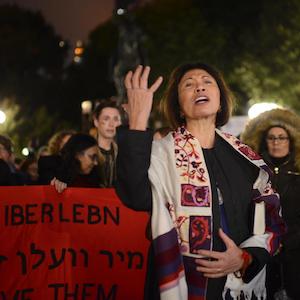Jewish Women's Archive
The Jewish Women’s Archive (JWA), a national non-profit organization, seeks to collect and promote the “extraordinary stories of Jewish women.” The JWA is oriented especially toward celebrating Jewish women in our contemporary context, but collects a variety of primary sources documenting Jewish women’s nineteenth-and twentieth-century history including first-person accounts in the “Western Pioneers” section, a searchable link to The American Jewess, the first English-language periodical targeted at American Jewish women, and excerpts of primary source materials in the “Women of Valor” sub-section. Finally, the JWA’s “Multimedia Gallery” allows users to search nearly 6000 digitalized images, transcriptions of interviews, pamphlets and more.
High school and college instructors will find much material here that they could incorporate into creative assignments and class activities, allowing students to connect thoughtfully to Jewish women of the past and the present. The site’s overall theme is the history of Jewish women’s participation in social justice movements and the links these women made and make between their faith, identity, and the public activities in which they engaged. The site features information on well-known figures (for example, anarchist Emma Goldman) and less-recognized activists, politicians, lawyers, scientists, dancers, artists, rabbis, organizers, philanthropists, and athletes. Students have the opportunity to examine unusual and well-presented primary source documents, as well as to read (or view film clips from) interviews with prominent women who are active in the present.
Teachers might use this material to encourage the examination of the relationships between the women whose lives are commemorated here and institutions of social stability (the church, educational institutions, the law, and the family) in the modern era, to analyze how such women as Ray Frank, Bella Abzug, and Beatrice Alexander became America’s first female rabbis, members of congress, and business leaders. Instructors might also encourage students to consider why the beliefs and practices of some activists, such as Goldman, provoked such contemporary criticism, while those of others, such as Frank, were much less contested.
The site’s “Teaching Tools” section contains an exceptionally useful collection of materials for instructors. It provides access to over 50 lesson plans, ranging in topic from “Girls in Trouble” (stories of women in the Torah who reflect the complexity of contemporary lives) to “Jewish Time Jump” (stories bout Judaism and Labor), which refer to a variety of primary-source documents contained on the site. There is a fascinating collection of cartoons, film clips, letters, news articles, organizational records, artifacts, photographs, and speeches covering the period from 1800 to 2000 and including such topics as anti-Semitism, arts, labor, immigration, Zionism, law, and women’s rights.
The “Understanding Primary Sources” section provides a great basic introduction to the use of primary sources, and strategies educators can use to encourage their students’ approaches to them.
The range of women whose lives the JWA explores will assist instructors wishing to illustrate the variety of activities in which women, and in particular Jewish women, have participated despite the social barriers they faced. The JWA presents a comprehensive approach to dealing with primary-source documents; this approach challenges instructors and students to think historically about these women and the sources we may use to reconstruct their experiences.
